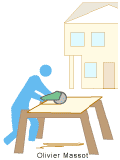- Publications:
- Newsletter:
- How-To Tutorials:
- Consumer Guides:
- Related:

How-To Hire A Contractor!
[ Family Circle Archive ]

No-Fail Guide to Hiring A Contractor
By Al Ubell and Label Shulman
Published May 31, 1983 - Family Circle Magazine

Remodeling your house can be both rewarding and frustrating. The key to success is planning smart and hiring the right person for the job. Use our expert tips and handy checklists to avoid making costly mistakes.
Sooner or later, most home-owners need more living space for their growing families, or they might want to change their kitchen or bath-room. Higher mortgage interest rates, rising home costs and general economic uncertainty are some of the reasons why more and more people are deciding to remodel or add on to their current home instead of buying a new one.
If you're planning to remodel your house, be prepared for frustrations. What you'll surely remember is the dirt, the dust, the dirt and more dust. Even under the best of circumstances, your family routines will be upset for days, even weeks. And keep in mind that all contracting jobs take longer than anticipated and cost more than expected. You can easily add 10% to 15% to your original estimate.
How to Find The Right Person For the Job
Before you even begin to discuss your remodeling with any contractor, it is vital that you make some basic decisions about what it is you want done. Visit kitchen or bathroom showrooms. Visit neighbors who have had similar work done. Ask them lots of questions and write down their costs, problems and suggestions. Make sketches. Take measurements of appliances and fixtures you like.
Next, make a list and some rough drawings of the features you want to include in your new kitchen or addition. You need to determine how much you will have to spend both from available savings and what you'll be able to borrow. Then, and only then, should you begin to call on contractors to meet with you and give you bids on the work to be done. You should consult at least three contractors. Be certain they quote prices on the same list of specifications and materials. Be wary of very low bids - it could mean the job will not be completed to your satisfaction.
Ask each contractor for three recent jobs you can visit. Call those homeowners and ask permission to come see the completed job without the contractor being present. During these visits observe the quality of the work and ask the following questions about the contractor and the workers who were employed on the job:
- Did the contractors clean up each day?
- Did they finish on time?
- Were there many unspecified extra costs?
- Did the contractor readily return to correct any problems or finish detail work?
Evaluate the bids at your leisure. Don't be rushed by concern about a busy contractors schedule, or the “threat” that “materials will be going up in price next week, so sign the contract now and take advantage of lower prices.” This rarely is true. Once you've come this far, you are probably ready to choose the contractor and write a contract - a crucial, time consuming task which must be done with care.
YOUR CONTRACT: What It Should Include
- Specifications and drawings of the design and materials to be used. (See our “Handy Home Remodeler's Checklists,” so you won't overlook any important details.)
- Terms of financial obligations and schedule of payments.
- Procedural terms. Find out how the contractor will work: beginning and completion dates, overtime charges, etc.
- Ask about the contractor's insurance requirements and obligations. Who's responsible for fire, theft, liability, bodily injury, workmen's compensation and other kinds of insurance? You may have to take out special insurance.
- A detailed list of legal documents to be obtained before (permits) and after (certificate of occupancy, Underwriters Laboratories listing on electrical work, plumbing certificate, guarantees on equipment, etc.).
- Always include a “non-transfer” clause, so the contract cannot be assigned to another contractor with whom you have not dealt.
- It's also a good idea to include the following four clauses in your contract:
- Work required under this contract shall include but not be limited to: all labor, materials, equipment, appliances and services necessary to furnish and install all the items indicated herein, unless otherwise specified. If the contractor substitutes any item, a sample must be submitted to the owner, and written approval from said owner must be received.
- All work shall be performed to the best standards known' to the trade by skilled workers regularly engaged and specializing in the work they are called upon to perform. All work is to be in accordance with all applicable drawings, specifications, contract documents, local, state, federal codes or regulations.
- All material shall be new unless otherwise specified.
- The work shall be completed to the satisfaction of the owner(s) or their representatives before final payment.
Home Improvement: DO'S & DON'TS
- Don't give a deposit until the work begins. A start-up amount of about 10% is customary on the day the job commences, or when materials are delivered to the site. One exception: A deposit is generally required for kitchen cabinets, appliances and any custom-made shop work.
- Don't pay the contractor more than the value of the work completed to date. You'll have to become a good “guesstimator”.
- Don't confuse friendliness with business. If you and your contractor become friends, it should be only after the job is finished to your mutual satisfaction. The contract should set the guidelines.
- Do make certain your homeowner's insurance will cover any accidents to workers on the job. You may have to take out special insurance just for the remodeling.
- Do avoid accusations between you and the contractor about stolen property. Put your valuables into storage.
- Do keep a remodeling diary to protect yourself from misunderstandings. Keep a daily log, describing what has been done, in your own words. Record conversations with the contractor as well as any promises you or the contractor makes. Don't skip lines or leave open spaces in your diary, since it could become a legal document.
- Do document all the work in progress with photographs. They will help you recall the pleasure of seeing the before and after. And they will be available, if needed, in a contractual dispute. (We hope this won't be necessary!)
Handy Home Remodeler's Checklists
| Bathroom Checklist | Kitchen Checklist | Other Areas |
|---|---|---|
|
|
Floor:
Walls:
EXTERIOR
Foundation:
Exterior facade:
|

Copyright © Alvin Ubell, Label Shulman & Family Circle Magazine - 1983
Accurate Building Inspectors ®
www.AccurateBuilding.com




